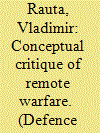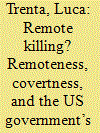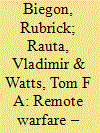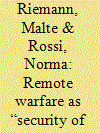|
|
|
Sort Order |
|
|
|
Items / Page
|
|
|
|
|
|
|
| Srl | Item |
| 1 |
ID:
181635


|
|
|
|
|
| Summary/Abstract |
This paper presents a conceptual critique of “remote warfare.” It argues that “remote warfare” is more of a trendy term than a robust concept. In support of this assessment, this paper makes two arguments. First, that there is a lack of clarity in the debate over what “remote warfare” is: namely, the literature is yet to explain what it entails. Second, that because of this lack of definitional specificity, we also lack an account of its analytical value: what intellectual leverage does it hold over existing terms making similar claims? The article discusses these points by expanding on the notion of “semantic field,” which it uses to assess how “remote warfare” contributes and is shaped by the broader conceptual confusion in the study of contemporary war and warfare.
|
|
|
|
|
|
|
|
|
|
|
|
|
|
|
|
| 2 |
ID:
191047


|
|
|
|
|
| Summary/Abstract |
The reported militarization of the Horn of Africa by Middle Eastern states has generated great interest among scholars and analysts alike. Their analyses and articles about the projections of power from the Middle East to the Horn of Africa are exaggerated, however, because they underappreciate the extant and enduring security burdens of the states in question and overestimate their national power capabilities. This is largely due to common misperceptions and faulty measures of military power. The question that this article answers is therefore not whether states such as Turkey or the United Arab Emirates (UAE) could redeploy limited military resources extra-regionally, but why would they and for how long? Using empirical data from interviews, defence statistics and data from recent deployments of the UAE and Turkey, we show how these key players are inhibited from prospective, long-term, and sustained deployments extra-territorially. This is supported by our analysis of the two states’ power capabilities (latent and actual) and their security burdens that constrain and limit options for the use of military tools abroad in the pursuit of foreign policy aims. This has led both Turkey and the UAE to engage in various forms of remote warfare involving local partners, allied militias, and mercenaries.
|
|
|
|
|
|
|
|
|
|
|
|
|
|
|
|
| 3 |
ID:
181631


|
|
|
|
|
| Summary/Abstract |
The recent assassinations of General Soleimani and Mohsen Fakhrizadeh have renewed debates surrounding governments’ use of assassination. Some commentators have interpreted these episodes as an escalation in practices of “remote warfare.” Recently, the literature on remote warfare has expanded to include multiple activities at – and below – the threshold of war. From its original focus on geographical distance, “remoteness” now encompasses the “political” distance of deployments of force. In this understanding, “remoteness” has blurred the line separating the methods used to deploy force and the ways – overt or covert – in which they are deployed. Having highlighted the role of covertness, this article establishes that assassination should be included in the “remote warfare” canon. A study of the US government’s involvement in assassination permits us to elucidate the interplay between remoteness and covertness. The article shows that a deeper engagement with the assassination as a tool of US foreign policy provides two main advantages. First, it permits us to better historicise the “opacity” and “political distance” of practices associated with “remote warfare.” Second, it helps unveil the origins of the legal, political, and technological infrastructures that currently sustain much of the US government’s global “remote wars.”
|
|
|
|
|
|
|
|
|
|
|
|
|
|
|
|
| 4 |
ID:
181629


|
|
|
|
|
| Summary/Abstract |
The debates around remote warfare have grown significantly over the last decade, leading to the term acquiring a certain buzz in the media, think-tank, and policy discourse. The lack of any serious attempt to reflect and take stock of this body of scholarship informs the scope of this special issue, in general, and of this article in particular. This paper addresses this former gap and, in doing so, serves a threefold purpose. First, to provide a state-of-the-art review of this emerging debate. Second, to both categorise what properties make a buzzword and to make the case for why existing remote warfare scholarship should be approached in this way. Third, to introduce how the various contributions to this special issue extend the debate’s conceptual, theoretical, and empirical parameters.
|
|
|
|
|
|
|
|
|
|
|
|
|
|
|
|
| 5 |
ID:
181634


|
|
|
|
|
| Summary/Abstract |
Military power relies upon military capabilities, generated by organisations, infrastructure, and defence establishments. This paper highlights the importance of remote warfare to research on the transformation of military power in the contemporary world. It draws attention to the relationship between military capabilities that enable states to intervene in physically distant conflicts and their political legitimacy. It argues that remote warfare is best understood as a family resemblance of legitimacy problems associated with military capabilities, rather than a category of warfare, set of tactics, or strategy. It then identifies a framework for understanding the varied types of legitimacy problems associated with remote warfare: remote warfare consists of a set of problems that examine how military capabilities affect the ability of states to act without violating international norms, governments to act without violating domestic constraints, the ability of governments to control their exposure to interventions at distance, and their ability to avoid responsibility for the consequences. The importance of this approach is highlighted by the way that it helps to explain the importance of controversies over military infrastructure used to support interventions and therefore highlights the importance of work on remote warfare for the wider study of military transformation and military power.
|
|
|
|
|
|
|
|
|
|
|
|
|
|
|
|
| 6 |
ID:
189116


|
|
|
|
|
| Summary/Abstract |
This paper argues for the utility of remote warfare as a means of analysing the geopolitics of American primacy. Through the use of new technologies and surrogate forces to address security challenges with a minimal military footprint, remote warfare (re)imposes political distance between the United States and the sites of its military interventions. Its constitutive modalities of intervention range from drones and Special Operations Forces to Private Military Security Companies, security cooperation programmes and emerging technologies associated with Artificial Intelligence. As public support for large-scale overseas interventions has dwindled and strategic competition with China has intensified, remote warfare represents a means of ‘retooling’ US primacy, which is both a structural condition and a strategic orientation. As a strategic approach to the use of force, remote warfare enables the American state to project military power in a more flexible and sustainable manner. This has supported the maintenance of US primacy as Washington’s strategic focus has shifted from counterterrorism towards a renewed emphasis on great power competition.
|
|
|
|
|
|
|
|
|
|
|
|
|
|
|
|
| 7 |
ID:
181632


|
|
|
|
|
| Summary/Abstract |
This article analyses remote warfare from an ontological security perspective, arguing that remote warfare needs to be understood as a response to states’ internal self-identity needs. We develop this claim by analysing an emerging aspect of remote warfare: Security Force Assistance (SFA). SFA is aimed at building up the security forces of partners, sharing best practice, assisting in security sector reform, fostering collaboration, and overall contributing to conflict resolution. Focusing on the UK, we show how and why ontological security needs are a driving force behind the UK’s SFA program. We outline the UK’s specific autobiographical narrative, which we call a “global engagement identity,” explore the crises that induced ontological insecurity, and show how the UK’s SFA program can be read as a routinised foreign policy practice aimed at taming uncertainty and reinforcing ontological security. This paper makes three contributions. First, it analyses remote warfare through an ontological security framework, thereby moving the focus from “security-as-survival” to “security-of-being.” Second, it highlights the importance of SFA as a remote warfare tool. Third, it shows the centrality of ontological security in understanding UK defence policy.
|
|
|
|
|
|
|
|
|
|
|
|
|
|
|
|
| 8 |
ID:
181633


|
|
|
|
|
| Summary/Abstract |
This paper aims to develop the study of remote warfare’s constitutive “remoteness.” It proposes a novel definition of remoteness as the degree of the American public’s socio-psychological detachment from the realities of political violence fought at a physical distance from the continental United States, as mediated through spectatorship of the use of military force. The remoteness of remote warfare has physical, psychological, and social properties. We argue that it exists on a continuum subject to change over time and should not be approached as a fixed condition measured solely by the physical distance separating combatants involved in armed fighting or as the use of various weapons technologies. The numerous dynamics associated with the remoteness of remote warfare are illustrated through an examination of American military intervention in Libya during Obama’s presidency. From the height of the 2011 NATO intervention in the country onwards, US military operations in Libya became more “remote” for the American public. Whilst other contextual factors contributed toward this outcome, we argue that the diminished spectacle surrounding the 2016 Operation Odyssey Lightning helps explain the American public’s increasing remoteness from military intervention in Libya.
|
|
|
|
|
|
|
|
|
|
|
|
|
|
|
|
| 9 |
ID:
183727


|
|
|
|
|
| Summary/Abstract |
How must we understand and conceptualize the rationales and repercussions of remote warfare? This article contributes to scholarship on the ontology of remote war by analysing how Dutch officials engage with responsibility for the bombardment of an Islamic State weapons factory in Hawija, Iraq in 2015 under Operation Inherent Resolve. It observes that the main feature of Dutch officials’ accounts of Hawija is their diverse claims to not knowing about civilian casualties. Official narratives shifted from denial to secrecy to strategic ignorance. Bridging work on secrecy from the field of critical security studies with work on strategic ‘unknowing’ from ignorance studies, we propose a new take on the Foucauldian notion of ‘regimes of truth’. The regimes of truth that emerge to justify shifts to remote warfare – that it is riskless, precise and caring for civilian others – rely not merely on secrecy and denial but on feigned and imposed ignorance about casualties. Whereas denial can be disproven and secrecy has an expiration date, ignorance is more elusive and open-ended and hence politically convenient in different ways. Deliberate unknowing does not just postpone investigation and accountability but fundamentally and indefinitely obstructs it and thus sustains the regimes of truth for future remote wars.
|
|
|
|
|
|
|
|
|
|
|
|
|
|
|
|
|
|
|
|
|